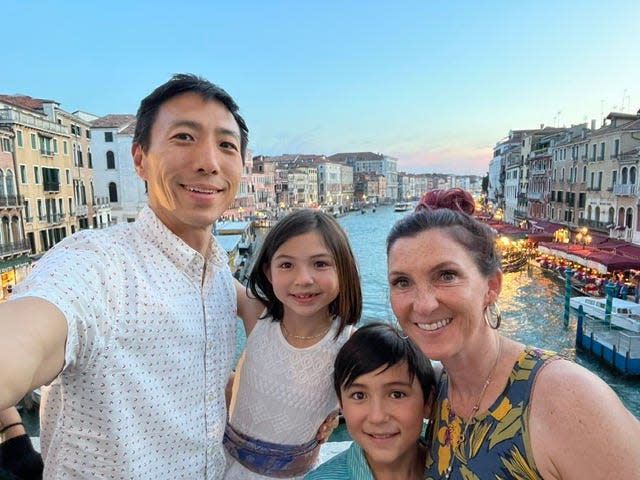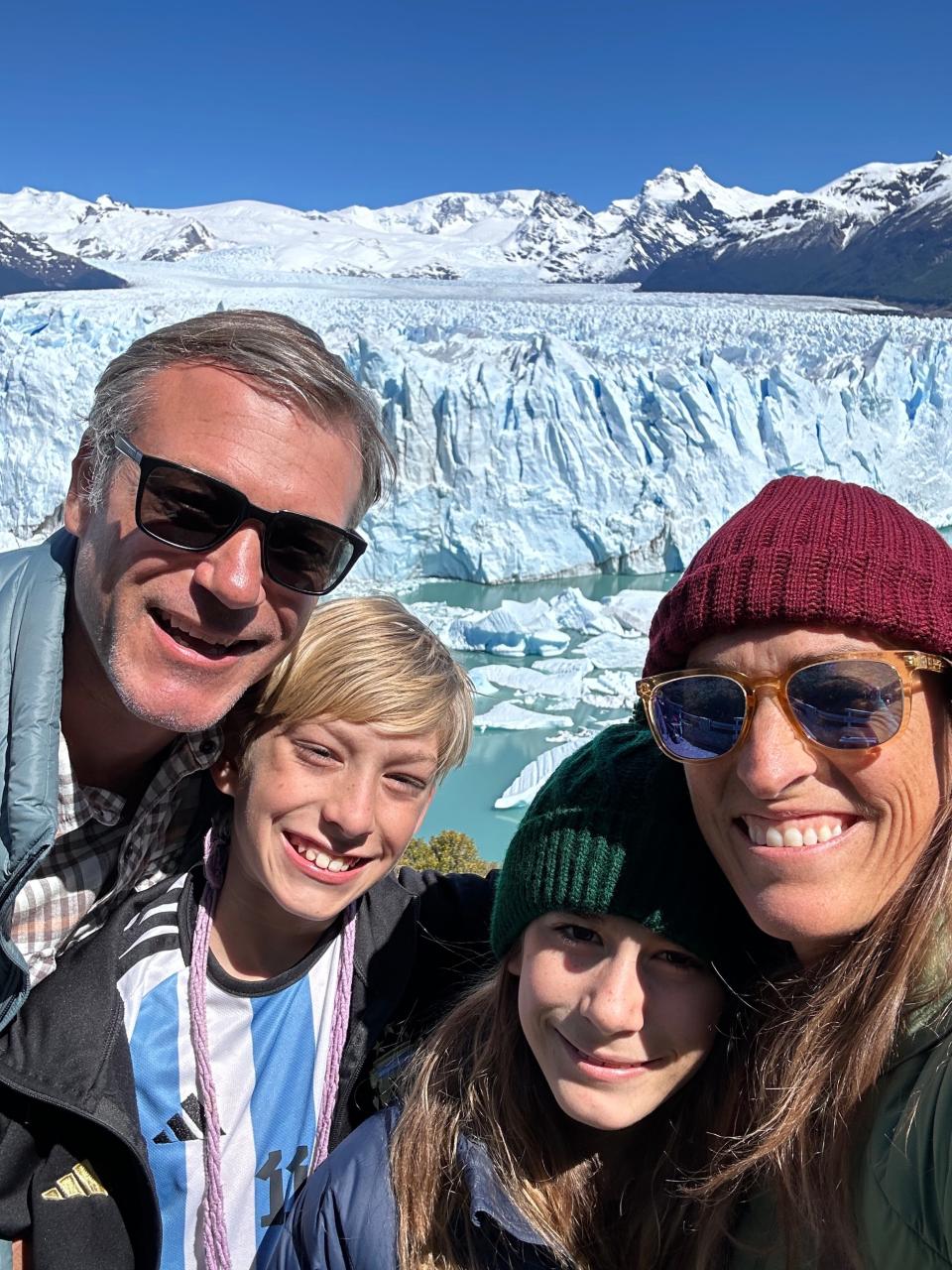Some millennial and Gen X parents are leaving it all behind to spend 6 figures on a family gap year. Here's how they budget and 'worldschool' their kids.
Some white-collar parents are leaving their jobs to take family gap years.
They say it's a reprieve from American life and a way to spend time with their children.
Immersive travel is key as parents prioritize local experiences to teach their kids other ways to live.
Claire Williams and her husband Matt had what you might call a Cadillac problem.
They were trying to figure out how to best use some money they'd saved. They thought about buying another home or adding an extension to their current one, but while spending time with their kids in quarantine, they realized what they needed more than anything was time.
"We thought, how do you buy time?" Claire, 40, told Business Insider. "The answer we came up with was stepping off the hamster wheel out of the daily grind."
So, Matt left his job of 11 years at an architecture and engineering firm and they set off in June 2022 to travel the world for a year with their then 13-,10-, and 7-year-olds to bond, broaden their worldview, and show the kids "that there are many different ways to live, work, and be happy," said Claire, a stay-at-home mom.
From surfing in Sri Lanka to riding camels in the Sahara, they traveled to six continents and 26 countries. They rented out their Bay Area house, cooked a lot while on the road, and meticulously budgeted for each country, estimating that they spent just shy of $100,000 living abroad for a year, excluding flights, insurance, and back-at-home costs like a storage unit.
Family gap years like this are a chance for 30- and 40-something white-collar parents who have enough cash to leave their jobs behind to show their kids a different way of life. It's a sabbatical with a twist — the kids are in tow and they're leaving their schools behind, too. Parents said they typically mix homeschooling on the road with worldschooling, which prioritizes immersive travel as education.
For a certain set, making a non-traditional move like leaving it all behind to take your kids around the world became even more appealing when the pandemic forced us to rethink life's possibilities.
It's sticking around as the world somewhat normalizes; Reddit is littered with threads looking for family gap year advice, which posters can easily find in various blogs. Travel with immediate family is the top travel trend for 2024, per travel network Virtuoso's Luxe Report. Parents said that while traveling for a year makes finding alone time hard and planning on the go is tiring, the family time is priceless and it can be an escape from the stresses of the modern American economy.
'We wanted to enjoy our kids while we were still their favorite people'
The 2020s economic landscape sent some families packing their bags. More than 50 million Americans quit their jobs in 2022 as burnout and work stress soared. Inflation hit a 40-year high, leading to the Federal Reserve trying to fight back by raising interest rates.
At the same time, those who owned real estate and stocks saw a major spike in wealth, and those who worked from home found increased flexibility, both sparking new possibilities in lifestyle.
Jennifer Spatz, founder of Global Family Travels, said she started receiving requests two-and-a-half-years ago in a newly vaccinated world from families looking to travel and educate their children for a year. She now offers a family gap year and extended travel planning service for $80 to $100 an hour. Once itineraries are approved, she works with travel partners to collect commissions on hotels and experiences.
"It could expand into a big business," she said, adding that her family gap year clients typically have disposable income and kids around 8 to 11 years old. Parents agreed that pre-high school years are the prime time, while kids are young enough to still value family time and old enough to absorb new experiences.
"We wanted to enjoy our kids while we were still their favorite people," said Amy Chang, 44. "If we took time off when they get to high school or college, that doesn't do us any good in building relationships with them because they're going to have their own lives by then."
Chang and her husband Allen were among the 63% of physicians burned out after working through COVID-19. She said their jobs put them in a privileged position to save money, as did having few student loans, living in a house they could afford on one salary, and driving the same car for 12 years. With a solid financial cushion to cover a year's mortgage and traveling, they left central Massachusetts with their then 9- and 7-year-olds in August 2022 for a road trip around the US to visit national parks before heading off to Asia and Europe.

They rented an RV from a local family, cooked on the go, and stayed in Airbnbs. They stayed under budget, which included their savings plus room for an emergency fund after returning home.
"Even though it was a huge expense, it was worth it…even if it means working a little longer on the tail end of our careers," she said.
World lessons, no classroom required
No family gap year is complete without immersive travel. Parents said they've read "The Iliad" while in Greece, attended worship services from different religions, and taught their kids how to navigate a foreign city — all parts of their desire to provide their kids with real-world schooling.
They typically value regenerative tourism, which involves giving back and positively impacting places as you travel. They want a local's experience rather than a cruise or all-inclusive resort, Spatz said. She often plans trips that involve work and education aligned with the United Nations Sustainable Development Goals, like gender equality or access to clean water. For example, one of her families will be wrapping up their gap year in July in a remote Nepal village, working with a woman who started a school.
"It's learning about the different cultures and history, but taking the kids out of that traditional classroom," she said.
Claire wanted to "get beyond the surface" by participating in Workaway, in which they stayed with local families in exchange for helping them around the home. In Sydney, Australia, they helped a family clean chicken coops on a 300-acre cattle farm. In Santiago, Chile, they helped care for baby quails on a poultry farm. It allowed them to save money and live with locals side-by-side, she said.
Marisa Vitale, 47, has been experiencing different ways people live around the world, often choosing non-touristy areas to understand how the neighborhood works. She and her family lived in a Spanish-intensive homestay in Guatemala, with an indigenous Hmong family in Vietnam, and in an Argentine estancia to learn how the gauchos work the land.
For her 11-year-old-twins, she said has been "a masterclass in history and anthropology," adding that her kids write reports and create art projects for each country they visit.
"Right when they're on the cusp of becoming young adults, what better way to understand who they are and how they feel in their skin than to take them through a wide variety of ways to live," she wrote over email from "deep in the desert" of Jordan, where they were staying in a Bedouin cave. "Empathy, kindness, and patience are the main things I take away from traveling. We wanted our kids to see those in so many different faces and places across the globe."

Her family plans to return to their Los Angeles home, which they rented out, this July. She halted her work as a self-employed photographer and her husband is on a yearlong sabbatical from his 15-year government job. While their monthly budget changes depending on where they're traveling, she estimates that they spend about $10,000 a month between lodging and general expenses, with a small amount of leeway for splurging on an experience.
A year later
A gap year also proves educational for parents. It helped Chang and her husband recalibrate their work lives. She's now doing shift work as an OB-GYN hospitalist — a better work-life balance than her previous work in private practice — and her husband is doing a fellowship to figure out how physicians can use AI.
"He wouldn't have been able to research or think about that at all if he hadn't had the time off," she said.
Re-entry was a little harder for Claire, despite Matt returning to his previous job. She said traveling cost them an average of $261 per day, less per day than their daily life in California. That included food and beverage, lodging, entertainment and experiences, ground transportation and fuel, and miscellaneous living expenses like medicine or SIM cards.
"When you remove your mortgage, gas, insurance — there are so many little things that are gone when you're on the road," she said.
Right now, they're living in Salt Lake City for two years as they contemplate what's next and prepare to launch a podcast about their travels. She hopes to keep the adventure going.
"Our time abroad felt not overwhelmed by consumerism," she said. "In the U.S., everything from highways to shopping to grocery stores is just really big and loud. So much of our gap year was really quiet and authentic and simple."
Read the original article on Business Insider

